
mind.in.a.box are a special case in the world of synth music. Their music hails from the same body music tradition that gave birth to millennial futurepop, but is equally indebted to progressive trance, Commodore 64 SID compositions, and even far out space disco sounds. While main producer and instrumentalist Stefan Poiss has evolved their perfectly realized digital sound to include significant organic and human elements, lyricist Markus Hadwiger has been weaving a singular cyberpunk narrative through each album, following the mysterious operative Mr. Black down a maze of betrayals and double crosses the alleys of a noir dystopia still to come. With their comparatively brief but complex and multi-faceted discography about to expand with the release of Memories on March 24th, we thought it would be a good time examine where mind.in.a.box have been, so as to better chart and understand where their singular vision might take them in the not so distant future.
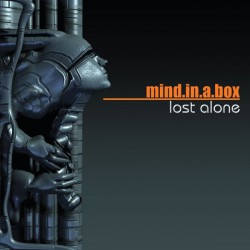
Lost Alone
Bruce: Ten years is more than enough time for a band to carve out a niche and develop their sound, but it’s not so long that one forgets what impression was made by their first release. The difference between Lost Alone and so many of the other cyber-themed albums and bands of the day still stands out. Yes, trance elements are being integrated into moody electro in a way commensurate with the millennial futurepop milieu, but the builds and falls constructed here never seemed like they had the dancefloor in mind. Rather, they sound totally in the service of the ebb and flow of emotion which has always remained at the heart of the band’s music. The great trick here is that the voices with which m.i.a.b introduced themselves to the world could not possibly have sounded any more robotic. Surely, this was as close to artful music wholly composed by computers as we had yet heard, but the message such new intelligences conveyed was utterly human: “I feel sad, so left alone, words are not enough for me to live on”.
Alex: The albums that followed it really set mind.in.a.box apart, but it’s interesting to look at Lost Alone as product of the post-futurepop school of EBM that included Rotersand and Seabound. Like those groups m.i.a.b. were working to rehabilitate the pop angle of body music, but their goals read very differently; every programming and production decision on the album is calculated to convey emotion and accompany the band’s overarching science fiction narrative. That idea, the application of meticulous in the service of emotion is the essence of mind.in.a.box’s catalogue, even moreso than the storyline that starts here and wends it’s way through the following records. Speaking of which, it’s worth noting that understanding of the actual nuts and bolts of the tale mind.in.a.box are telling has never been necessary to enjoy their albums. As evidenced on songs like “Questions” and “Falling”, Mr. Black and his mysterious quarry are useful devices to explore various themes of identity and consciousness, but not lynchpins for appreciation of this profoundly human synthetic music.
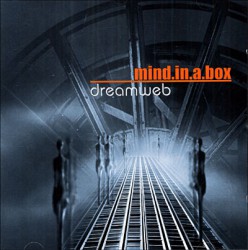
Dreamweb
Alex: Dreamweb is a pretty weird sophomore album. Lit from the style and storyline of its predecessor, there’s a weird sense of restlessness, as though mind.in.a.box were already feeling eager to play the template they established on Lost Alone. That’s not to say that it’s inconsistent or out of step with the band’s discography, but that the music is infused with a sort of reined in experimentalism that spoke to a deep desire to expand the boundaries of their sound. The balance between introducing new sounds and holding onto the sound of their debut is never awkward, although the album’s best moments – like the tense and evolving “Dead End”, single “Certainty” and early Poiss vocal showcase “Dream” – have always had an uneasy sensibility to my ears. The record’s arrangements never feel entirely at home on the dancefloor or in the headphones, like an internal struggle to figure out exactly what the project is going to be about. It’s probably mind.in.a.box’s most overlooked album (and arguably their weakest), but listened to in the context of their discography it certainly has a place as a bridge between the sleek mechanical air of their early material and the measured, songwriterly approach they would soon start to ply.
Bruce: That tension between the club and headphones seems key. I’d say m.i.a.b. are in part so beloved because they’re one of the very few bands of their ilk and era to never clearly come down on one side of that fence (the aforementioned Seabound are one of the others that come to mind). But on Dreamweb there seems to still be some fretting anxiety about how to pitch their material to the audience which was intrigued by the debut, and possibly the walking of that line. The record often seems to split the difference, with tunes like “Sun And Storm” and “Out Of Time” aiming right for the floor, with the moody atmospherics left in the corners. I’d forgotten how much I dug “Lament For Lost Dreams”, by the by.
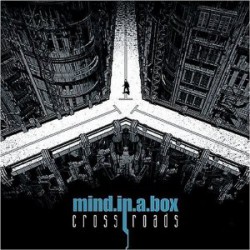
Crossroads
Bruce: I wasn’t paying as much attention to wholly programmed material in 2007 as I had been before, or as I do now, and so I came around to giving Crossroads some serious listens a year or so late. My loss. The one-two punch of “Fear” and “Stalkers” may stand as the greatest twelve minutes in m.i.a.b.’s discography, and a great summation of everything that makes them such a beloved band. The first clinches the emotional tension that had always run through the band’s work, raising it to blood-chilling panic attack levels. The second fleshes out the world of the band’s narrative, giving us a sense of the fate which might’ve befallen Black had he succumbed to White’s mind-wipe. It’s also a perfect hybrid of their ear for the club and their more experimental, proggier side. I can’t think of any other tune I’ve heard in the last decade of industrial clubbing which has cinched a lengthy dancefloor build by tossing a synthesized guitar solo overtop, but here we are: three albums in, mind.in.a.box can do anything they want and sound fantastic doing so.
Alex: The record’s opening line, “Two days ago I woke up underwater” is absolutely perfect, both as an immediate return to Black’s story and as a table-setter for the mood of their best album to date. The literal nature of songs like “Amnesia” and “What Used to Be” is especially notable in contrast to how free flowing and energetic their arrangements are, mind.in.a.box having found a way to expand beyond self-imposed creative boundaries without ever losing the thread of their own, well, identity. For all the clinical detail put into the construction of Crossroads there’s a wonderful sense of synergy pervading it, with its themes (both lyrical and musical), production, and performance wholly intertwined. That symbiosis is so perfect that mind.in.a.box are free to go anywhere, from piano led ballad “The Place” to the tense digital orchestration of “Run For Your Life”, the project’s horizons feel absolutely endless.
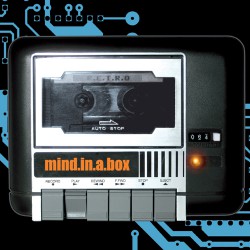
R.E.T.R.O.
Alex: On paper it’s no surprise that a band like miab would make an album dedicated to the Commodore 64, although the total departure from their established storyline makes it a little harder to position it in relation to all of their other work. In isolation it’s a pretty killer LP though, covers of C64 game themes like the stately “Last Ninja 3” and “Mindkiller” (a zoned out take on the theme music from classic shooter Parsec) share space with cute video game themed electropop numbers like “8 Bit” and “I Love 64”. The latter two numbers are wholly unique in that they’re one of the few times mind.in.a.box show a whimsical side to their work, although the quality of their construction belies their mildy silly lyrical conceits. As a kind of “spot the influence” exercise it’s a pretty fun listen, although the two closing numbers certainly point back from diversion to the band’s grand overarching plan.
Bruce: I feel like I mentioned this earlier, but in retrospect this album feels like an enticing missing link between chiptune and outrun electro from a time when the former was wearing out its welcome but the latter hadn’t coalesced. If records of this type had been the band’s modus operandi from day one, I don’t think we’d consciously be wishing for much else. Also, for whatever it’s worth, I played “The Last Ninja” a heck of a lot in my youth (admittedly on the Apple ][e, not the C64), and I certainly don’t remember hearing anything half as exciting as the massive, solo-heavy tunes m.i.a.b. hewed from its original bleeps. That said, while I never messed with “Light Force”, the original tune mixes a processional reflection with full-bore space opera power trips. Definitely primo m.i.a.b. source material, detour record or no.

Revelations
Bruce: The switch back to the gravitas of their on-going narrative albums after R.E.T.R.O. was bound to be a cold splash of water regardless of what Revelations sounded like, but even deeper changes were afoot. A stronger organic and acoustic presence was integrated into the m.i.a.b. template, with the record kicking off with a dusty snare riff which wouldn’t have sounded out of place on umpteen trip-hop or downtempo records, and ferreting out what was programmed and what wasn’t became an interesting dilemma, unthinkable just a couple of albums previous. The line between Black the character and Poiss the composer also blurred: while the overarching storyline was in place, the distinction between it and Poiss’ own reflections wasn’t always clear, an issue muddied by the increasing presence of non-processed vocals.
Alex: This might be the first time that a mind.in.a.box record has felt written as opposed to constructed, and whether it’s the influence from their full band oriented liveshows or the increasing self-reflective nature of the lyrics, it reads as their proggiest effort. I actually find I enjoy it more now than I did at the time of release. A song like “Tradition” finds Poiss really coming into his own vocally, and while the issue of parsing character and performer can be felt in the content of “Control” and “Not Afraid”, it’s not terribly distracting on average. A more worthwhile thread to explore Revelations is the way in which the story turns in on itself, with Black (or is it Poiss?) examining the implications of each chapter detailed thus far. There’s even some suggestion on “Second Reality” that Black has become aware of his role in some grand metafiction, an idea that would be self-indulgent if the band hadn’t spent so much time exploring questions of character and intellectual selfhood. Whether it’s a brief interlude or the beginning of a journey into further abstraction, is unclear, Revelations leaves mind.in.a.box “standing tall, thoughts free to roam/knowing where [they] belong”.
mind.in.a.box’s new album Memories is out March 20th/24th on Dependent in Europe and Metropolis in North America. Watch this space for a review.
A Rough Guide to mind.in.a.box



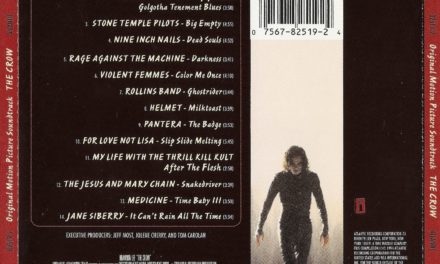
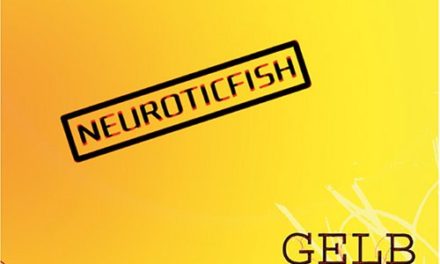
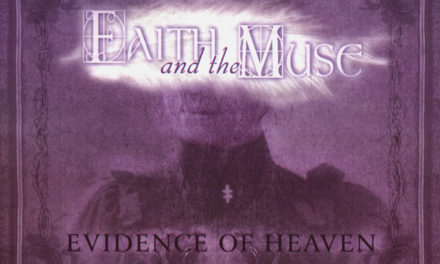
Some RETRO background: on the Dependent forum, the idea was pitched to Stefan Herwig about the possibility of releasing demo material for the label bands. There was a lot of positive feedback and interest in the idea, so Herwig then pitches it to some bands, in particular MIAB since they had bucketfuls of unreleased material such as Parsec. Heads were banged together, and RETRO was the result, giving an insight into the pre Lost Alone era; it was never meant as a snug fit with the storyline. I think the idea was for further releases of this type, in a Back And Forth type manner, but then Dependent and MIAB went their own ways…
Thanks for the insight Sheva!
Good stuff. I was expecting this to be more of a primer to the storyline, like who is who, but I appreciate the focus on the music as well.
For me, I think Revelations is miab’s weakest album. It felt like it was born out of Stev’s desire to take miab live, which was a colossal failure in my opinion. Their set at Kinetik was particularly brutal. He incorporated unnecessary guitars, ditched much of the vocal effects, and left out the skit tracks that propelled the narrative on previous albums. But more importantly, Revelations lacked hooks. There are none of the memorable choruses that made Crossroads so brilliant.
From what I’ve heard of Memories, it sounds like a fantastic return to form, and I’m really looking forward to it.
I really liked “Revelations” a lot, but I do agree that it was difficult to tell the storyteller from the character a lot of the time. Now that Mr. Poiss has the magnificent THYX banner under which to express himself – his own, actual self – I have high hopes that “Memories” is going to return us to our story in progress.
BTW: If you have iTunes create a mind.in.a.box radio station. Trust me on this.
Great review of their work so far.
I for one am unable to tell which album is the best. I have a problem to find a bad sound in their whole discography. Actually everyhthing else but a couple groups sound flat and “boring” compared to this stuff. They’re all just great and which one I will prefer at the present moment depends on my mood (or what kind of mood I want to get into:))
I don’t listen to RETRO too much as a whole (this commodore passages are sometimes too much to take for me) but I love “8 bits”; “Whatever Mattered”; “Mindkiller” and play them often in my audio device.
I absolutely love M.I.A.B but I have to say … “Lost Alone” is the weakest of the four concept albums. It’s still fantastic, like everything Poiss and his team do, but it doesn’t quite surpass the others because of a few songs that don’t hold up that well, namely “Take My Soul.”
Anyways, I was listening to Christoph Waltz on one of the late night shows, and he was asked about the difference between Germans and Austrians. He said Germans are like a battleship, where Austrians are like a waltz. The Germans will metaphorically punch you in the face, while Austrians are polite, playful, interested in melody, etc. I think that’s very appropriate here.
Also have to mention Stars Crusaders. Which Poiss did the mixing on. It sounds like the greatest M.I.A.B rip-off band, except M.I.A.B actually had a hand in it.
https://www.youtube.com/watch?v=S_0hHuaJqJQ